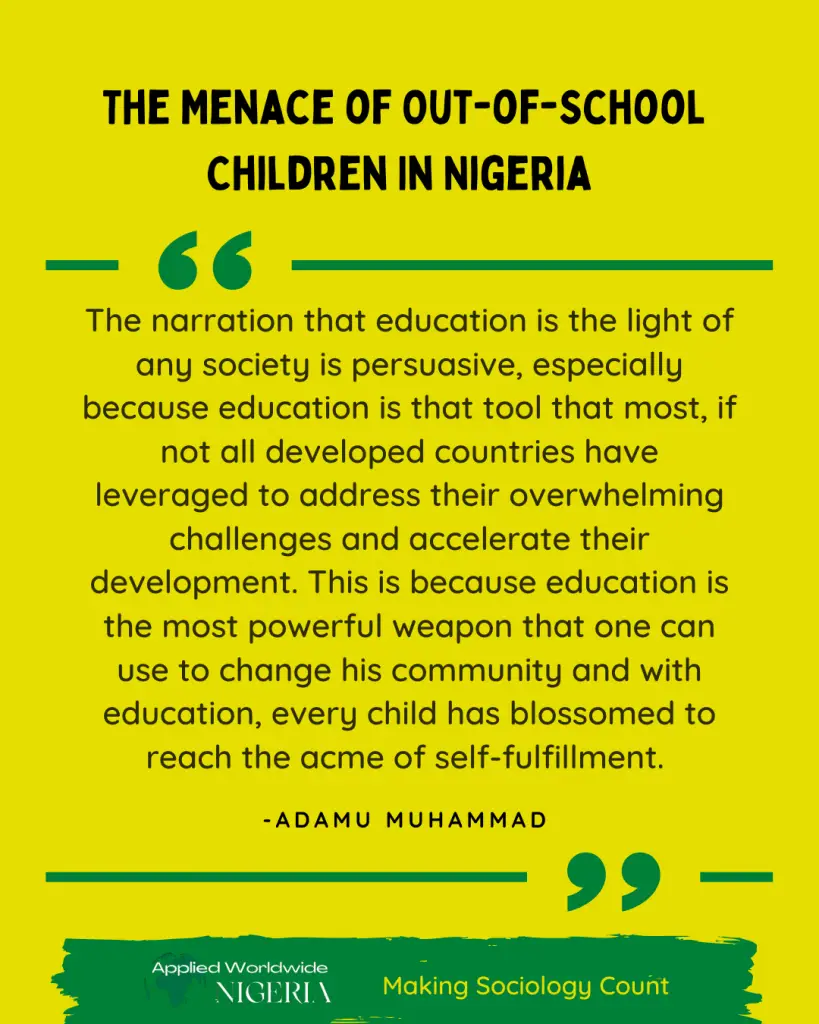The narration that education is the light of any society is persuasive, especially because education is that tool that most, if not all developed countries have leveraged to address their overwhelming challenges and accelerate their development. This is because education is the most powerful weapon that one can use to change his community and with education, every child has blossomed to reach the acme of self-fulfillment. However, out-of-school children are increasingly becoming a global concern, particularly in Africa where millions of children neither know how to read nor write. The menace in Nigeria is so alarming as more than 15 million children are out of school.
The most overwhelming challenge is that the issue is even spinning out of control in Nigeria UNICEF once said, “One in every five of the world’s out-of-school children is a Nigerian” proven that Nigeria is the headquarters of the out-of-school children in the world.

Why we need to eradicate the menace of Out-of-School children in Nigeria
This highest rate of the out of school children in Nigeria is undoubtedly a threat to our national security and development. The young children that are expected to become agents of change in the future, now have no access to education. Instead of being in schools, many children in Nigeria remained on the streets and end up their lives in begging and drug abuse. This of course has led to the regressiveness of Nigerian societies in the general and the northern part of the country in particular.
Speaking on the challenge of this menace to national security, former President Olusegun Obasanjo, at the 2022 Annual Lecture organized by Murtala Muhammed Foundation, nailed it right on the head. He opined that: “It does not matter how we deal with Boko Haram, bandits, kidnapping and abduction today,” he declared, “those 15 million children that should be in school [but] are not are the potential Boko Haram of 15 years from now.” Nothing to add.
Therefore, for Nigeria to address its security challenges, there is a need for addressing the root causes of the problem, out-of-school children inclusive.
Also, out-of-school children have resulted in many social vices in Nigeria including child begging, drug abuse, women marginalization, and restiveness, among others. It is pejorative that many scientific masters of tomorrow who would have come up with ideas to transform Nigeria are spoiled as a result of this menace. Our experience with Boko Haram and other security threats such as banditry and kidnapping are classical examples of the price we have to pay for our nonchalant attitude towards education.
What are the factors responsible for this menace?
There is a high consensus that economic barriers, socio-cultural norms, parents’ demise, and lack of community sensitization on the importance of education are the major factors responsible for the continuous rise of this menace. Also, poor infrastructure, inadequate funding, and inexperienced teachers have their roles.
The way forward
Understanding the fact that education is the most important ingredient of development and is a tool that even the developed countries have leveraged to address their challenges and come up with new technologies and entrepreneurial skills that provide them with job opportunities and accelerate their development, there is need for decisive and purposive action to minimize this horrific issue to the lowest ebb. In addition, its devastating effect on Nigerian society calls for the need to come up with effective strategies to ensure that our societies have adequate access to qualitative education for self-reliance and global transformation.
Despite the alarming level of this issue, the following antidotes will hopefully reduce it:
Basically, there is a need for adequate community sensitization that will instill in the minds of the people particularly in the rural communities the role of education in societal progress. This can be achieved if an extensive community sensitization would be carried out by our civil society organizations and other concerned citizens on the importance of education and its role in the transformation of society. The importance of this cannot be over-emphasized because many parents can afford their words school expenses but because of lack of awareness, they refused to send them to school. Therefore, by carrying out enough sensitization sessions, parents will voluntarily take their children back to school.
Secondly, it is also pertinent that government focuses on human capital development by establishing skills acquisition centers where people would be trained and empowered with entrepreneurial skills. This is very important as it will unveil a strong source of income that will enable them to sponsor their education. Government should also improve the standard of education in Nigeria through the allocation of enough funds to the sector, provision of necessary equipment, and a conducive learning environment, as well as improving the welfare of the teachers. The importance of this in addressing the menace cannot be over-emphasized.
Lastly, government and philanthropists should compliment parents’ efforts by providing scholarship assistance to the less-privileged, girls, and orphans. In this regard, government and civil society organizations should establish “Back to School Programs” where out-of-school children will be identified and taken them back to school. This of course will contribute immensely to the eradication of the problem.
If the aforementioned is to be effected, there is a great hope that the menace would become history, and Nigeria would become a country where citizens irrespective of their socio-economic status would have access to qualitative education for self-reliance, peace, and global transformation.






